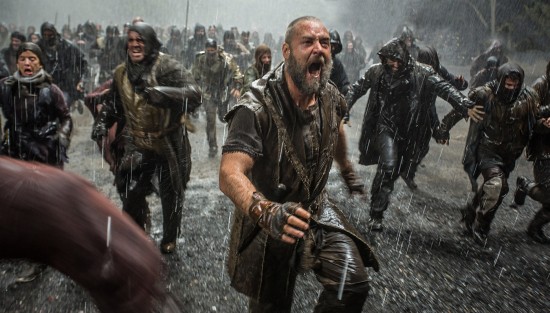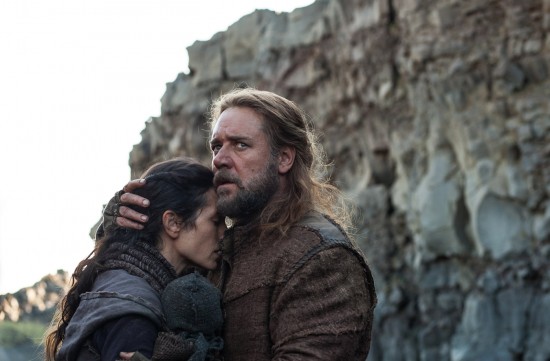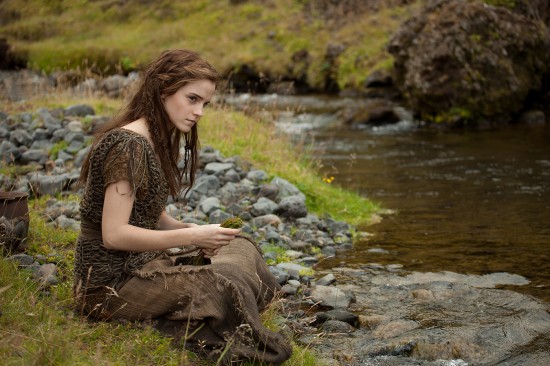'Noah' And The Inscrutable God
We may receive a commission on purchases made from links.
[The following contains SPOILERS for Darren Aronofsky's Noah. You can listen to our podcast review of Noah here.]
I once had a conversation with a friend of mine who has a Ph.D in Theology. We were discussing the nature of God, and I remember him saying to me, "I'm not sure if God exists. But if He does, He has a lot to answer for."
"Like what?" I asked.
"Well, for one thing, He's not a very good communicator."
As a person who was raised in the Christian faith, one of the most challenging things for me to accept is God's inscrutability. If there's a being who can speak the universe into existence, surely He could make it crystal clear what his commands are? Surely, He could make clear to us the actual truth of His existence? Surely, He could stop untold amounts of suffering and killing by just dropping some truth on us every once in awhile? This tension – between God's silence and His power – is a dynamic on full display in Noah, out in theaters right now.
In the film, Noah, who descends from the line of Seth, has visions of a righteous flood that will destroy humanity. God reveals to him in dreams that he must build an ark to save His creation. The Watchers, angelic creatures now imprisoned in stone, see the opportunity to redeem themselves by helping Noah accomplish his task, so they help Noah on his mission.
The film sets up a pretty simple binary. On the one side, there is Noah's line of people: peace-loving, humble, living off the Earth. On the other side, there's Tubal-Cain's people, a tribe of vicious savages who take what they want of the land and form God's creatures. When God gave Adam dominion over the planet, Tubal-Cain and his ilk took God a bit too seriously.
But when I watch the film, I'm left not with awe at God's righteous anger as he exterminates all life on the planet, but with the realization that the story of the flood is a pretty silly one to begin with. Firstly, the binary is not so simple, even as depicted in the film. We see Tubal-Cain's people act out all kinds of atrocities on each other, but at the end of the day, they're not so different from Noah, who's willing to abandon a woman to be trampled to death, or abstain from helping screaming victims of God's wrath as they cry for help directly outside of the ark. Even in the context of the film, Adam and Eve's original sin persists in Noah and his family. How good can these people actually be? And how different are they from Tubal-Cain, really? Does God really just favor vegetarians?
Moreover, does God really think that the most efficient way of declaring a "do over" on creation is to kill everyone on the planet except for a few humans and a bunch of animals? Why perpetuate all of that suffering and death? Why kill (presumably) innocent women and children?
That's one of the elements that I find powerful about Noah, even if it may be there unintentionally: when it comes to life and the Christian faith, sometimes there are no answers, only questions.
Another example comes to mind. In the book of Job in the Bible, the character of Job has everything taken away from him, all his belongings destroyed and his family slaughtered, apparently for the sake of some cosmic bet that Satan makes with God. Job denies that he's done anything wrong but still acknowledges that God is sovereign over Job's life and all creation. "The LORD gave and the LORD has taken away; may the name of the LORD be praised," Job says.
But towards the end of the book, God actually speaks, and says the following to Job and his friends:
Where were you when I laid the earth's foundation?
Tell me, if you understand.
Who marked off its dimensions? Surely you know!
Who stretched a measuring line across it?
On what were its footings set,
or who laid its cornerstone—
while the morning stars sang together
and all the angels shouted for joy? (Job 38:4-7)
Translation: "You're not me. You're not a creature of infinite power and knowledge. You can't possibly understand my ways."
And when I watch Noah, that's the Christian truth that I'm reminded of again and again. If there is a God, He's not a very good communicator. But, if there is a God, he may have reasons for not communicating that we don't understand, or that we couldn't possibly comprehend. To paraphrase another film that deals heavily with religion, sometimes we have to just accept the mystery.
Towards the end of Noah, after the family has been riding the ark for months, Noah is forced to make a difficult choice: whether or not to kill his granddaughters and end the human race right then and there. At a crucial moment, he looks up at the sky and demands answers from God. He's looking for guidance on whether to follow through with this terrible plan, a plan he believes to be God's plan. And after awhile of staring up at God...Noah becomes convinced that yes, God does want him to kill his granddaughters. As the audience, we don't see any evidence that God did, in fact, speak to Noah. We kind of have to take Noah's word for it.
Think about that for a second. In the universe of the film, we know with a reasonable amount of certainty that God exists. God gave Noah his prophetic vision and He directly intervened just when Noah and the ark were about to be overrun by Tubal-Cain's tribe. The God who spoke the universe into existence, who saved this family from annihilation single-handedly, that God chose not to deliver a crystal clear sign to Noah about what to do with the future of humanity. God certainly didn't make it clear to Noah's family what His grand design was.
But Noah is convinced that God is telling him he must take steps to end humanity. So he chases Ila (played by Emma Watson) up onto the roof of the ark and demands that she hand over her children. She accedes and Noah prepares to plunge a dagger deep into his granddaughters. But in perhaps one of the film's most moving scenes, he can't complete the task. He breaks down. Despite Noah's unshakable belief in the sovereignty of God, he can't go through with this heinous act. "I had nothing but love for them," Noah says of the twins later on.
I personally doubt that God was being crystal clear in his directives when Noah demanded it, at least in the world of the film. We don't see Noah have any sort of dream, as we did when he received a vision to build the ark. Perhaps Noah was just attempting to intuit God's will.
As the film comes to an end, Ila explains to Noah that she believes this lack of communication was the whole point. God wanted Noah to have the choice. On its face, that idea doesn't make sense to me at all. Noah's clearly willing to do whatever God tells him to do, even if it looks like madness in the eyes of the world (e.g. squirrel away all the animals on the planet, brace for torrential rain). Why couldn't God just tell Noah either way what He wanted?
One of the things I learned in Sunday School class (and particularly from the works of John Piper) is that God will choose the path that allows the most glory to accrue to Him. My interpretation of this story, as Aronofsky has realized it, is that God provided Noah with the choice of whether or not to kill his granddaughters. And when God provided that choice, Noah's choice of mercy is itself a reflection of God's glory.
Thus, the story of Noah is a microcosm for the choice that the Christian God provides all of us in the form of free will. God doesn't always come down in dreams or visions or hallucinations to inform Christians exactly what to do. As a result, we may not always choose correctly, but it is the fact that we have a choice, and the fact that we sometimes choose to do what is moral and righteous and in line with God's will that ultimately reveals God's true nature.
There's a verse in the Bible that describes Christians as "jars of clay":
But we have this treasure in jars of clay to show that this all-surpassing power is from God and not from us. (2 Corinthians 4:7)
Back in Biblical times, jars of clay were not particularly precious vessels. In fact, they were pretty crappy. It would be like the equivalent of cheap tupperware or dixie cups in today's age. Why would you choose to keep something valuable in there? But that's what is so powerful about the Gospel of Christianity – the idea that mankind, even though it is frequently a really crappy vessel to carry something important – is still the medium that God chose to spread his Word to the world. It's a really potent idea, and one that I think is critical to the longevity and survival of the Christian faith to this day.
In Noah, we see this idea played out in a variety of scenarios. We see this as Noah comes to terms with his own sins, during personal reflection on the ark. We see it as Noah spares his grandchildren, choosing mercy over (God's) justice. And we see this as he concludes that there's hope for humanity on this planet after all. And that some things are worth seeing through to the end, even if they will ever be imperfect.



